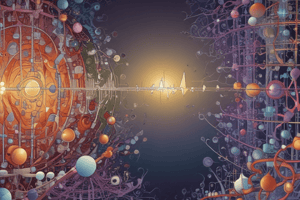Podcast
Questions and Answers
What is the process called when a drug is broken down to become more water soluble?
What is the process called when a drug is broken down to become more water soluble?
What does the term 'therapeutic index' refer to?
What does the term 'therapeutic index' refer to?
Which of the following is NOT a consideration when prescribing medication?
Which of the following is NOT a consideration when prescribing medication?
What is the study of how the body affects a drug called?
What is the study of how the body affects a drug called?
Signup and view all the answers
Which of the following routes of drug administration has 100% bioavailability?
Which of the following routes of drug administration has 100% bioavailability?
Signup and view all the answers
What is the term used to describe the study of how a drug works and its action on the body?
What is the term used to describe the study of how a drug works and its action on the body?
Signup and view all the answers
What does pharmacodynamics study?
What does pharmacodynamics study?
Signup and view all the answers
Which term refers to entering the gastrointestinal tract?
Which term refers to entering the gastrointestinal tract?
Signup and view all the answers
What does bioavailability refer to in pharmacology?
What does bioavailability refer to in pharmacology?
Signup and view all the answers
Which term describes the process where an inactive drug is converted to active forms by the liver?
Which term describes the process where an inactive drug is converted to active forms by the liver?
Signup and view all the answers
What is the role of ABC transporters in pharmacokinetics?
What is the role of ABC transporters in pharmacokinetics?
Signup and view all the answers
Which term refers to avoiding the gastrointestinal tract by using passive or active transport methods?
Which term refers to avoiding the gastrointestinal tract by using passive or active transport methods?
Signup and view all the answers
Study Notes
Pharmacology and Pharmacotherapy
- Pharmacology is the study of medicines, which are chemical substances used to diagnose, treat, or prevent diseases.
- Drugs can be either lab-based (synthetically derived compounds) or vitamins and minerals (over-the-counter).
Pharmacokinetics and Pharmacodynamics
- Pharmacokinetics is the study of what the body does to the drug, including absorption, distribution, metabolism, and excretion.
- Pharmacodynamics is the study of how the drug works and its effects on the body.
Absorption, Distribution, Metabolism, and Excretion (ADME)
- Absorption: how the drug gets to the target site.
- Distribution: how fast the drug reaches the target site.
- Metabolism: how much of the drug arrives at the target site.
- Excretion: how quickly the drug is dispersed and eliminated from the body.
Routes of Administration
- Enteral: entering the gastrointestinal tract.
- Parenteral: avoiding the gastrointestinal tract.
Transport Across Cell Membranes
- Passive transport: paracellular transport, diffusion, and facilitated diffusion.
- Active transport: ABC transporters that fit onto a receptor and move the drug into the cell.
Hepatic Metabolism and Bioavailability
- Hepatic portal circulation: from the venous system to the liver.
- Bioavailability: the amount of drug that actually gets into the system.
- First-pass metabolism: when an inactive drug is converted into active forms through the liver.
Drug Interactions and Considerations
- Phlebitis: inflammation of a vein.
- Hydrolysis: breakdown of a drug to become more water-soluble.
- Conjugation: attachment of an ionized group, making the drug less active and more water-soluble.
- Half-life: time for the amount of a drug's active substance to reduce by half.
- Therapeutic index: how much of a drug is needed before it becomes toxic.
- Potency and efficacy: amount of drug required to produce a desired effect and how well it produces that effect.
- Medical history and allergy considerations: understanding drug interactions and side effects.
Studying That Suits You
Use AI to generate personalized quizzes and flashcards to suit your learning preferences.
Description
Learn about the study of how drugs work within the body (Pharmacodynamics) and what the body does to drugs (Pharmacokinetics). Explore the concepts of pharmacology, pharmacotherapy, and toxicology in this comprehensive overview.




